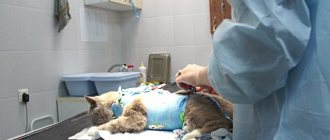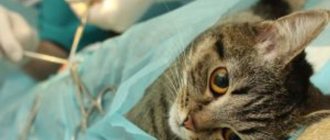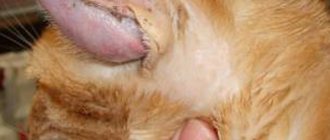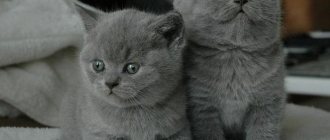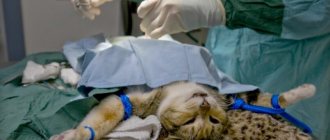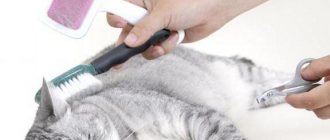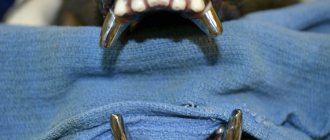Should a British cat be neutered? Definitely yes, if you are not a professional breeder. From this article you will learn: how to castrate a British cat, at what age it is best to carry it out, what care is needed afterward, and whether there are any features or contraindications.
Castration of cats is a procedure during which the gonads are removed. The operation itself is not complicated, but it helps to solve many behavioral problems and prevent a number of diseases. Therefore, if you do not plan to become a breeder, take your cat to breedings and exhibitions, it is worth castrating him, this will preserve his health and save yourself a lot of nerves, but more on that later.
What is castration?
Many people confuse castration with sterilization, although these are completely different operations.
During sterilization, the spermatic cords of cats are ligated to prevent the release of germ cells, but physical attraction remains. And castration of British cats is the removal of the gonads, when the production of hormones completely stops, which is why the cat is no longer interested in close “communication” with the female cat. Of course, not all genitals are removed, but only the testicles - through an incision in the scrotum. The operation is carried out under general anesthesia, subsequently its traces are visually completely invisible - you can understand that there are no testicles in the scrotum only by touch. Light anesthesia is used so that the cat does not experience pain and comes to its senses within 10 minutes.
Why castrate a British cat?
This procedure makes life much easier for the owners, allowing them to avoid many not very pleasant moments. After six months, all cats begin puberty, they become aggressive and leave marks throughout the house. Just yesterday, a cute kitten becomes a male, letting you know about it with a demanding meow. And it’s not the cat’s fault, the reason for this behavior is raging hormones, when the body begins to demand procreation.
Why is it worth castrating a British dog? Positive consequences:
- The cat stops marking the territory, which means the unpleasant smell disappears;
- The mournful night meowing stops, the owners can sleep in silence;
- The pet no longer tries to escape from the house to the street in search of a female;
- The likelihood of diseases of the reproductive system organs is significantly reduced;
- Castration allows you to prolong the life of your beloved pet;
- The Briton becomes a calm, playful and friendly cat again.
If we consider the negative aspects, there are practically no complications and negative consequences after castration of a British cat, with the exception of possible weight gain. Due to the fact that the pet becomes inactive, it recovers quickly. And in order to prevent obesity, it is necessary to adjust the cat’s diet: purchase specialized food from pet stores and it is advisable to remove milk and fish from the menu.
When is the best time to castrate a British cat?
After a small kitten appears in the house and the owners do not plan to get offspring from it, the question immediately arises: when should a British cat be neutered? The most optimal age is considered to be from seven months to a year. The operation can be done later, but earlier - in no case, since puberty has not yet ended and the body has not yet become stronger. But it’s better not to delay it for too long; it’s better to carry out castration before the pet has time to “know the delights of love.”
British kitten
In addition, the mentioned optimal age is the most suitable period for castration, since the body of a young cat tolerates anesthesia well. And given the fact that the British reach puberty later than others, they cannot be castrated until the age of seven months (representatives of other breeds undergo such an operation even at five months). As for undesirable age, older Britons can only undergo castration with the permission of a veterinarian, after a thorough examination of the cat by a doctor.
How is the operation performed?
The castration procedure begins with preparation for the operation. After the veterinarian examines the cat and carries out all the necessary tests, the Briton is given general anesthesia. It is advisable to carry out the operation in a hospital, since in cases of unforeseen complications you will need special tools and drugs that are not available at home. The surgical intervention takes from ten minutes to half an hour; before the operation, the cat cannot be fed for several hours. The castration itself takes place according to the following plan:
- The Briton is placed on his back and all his paws are fixed for better access;
- The veterinarian ties the spermatic cord and makes an incision over each testicle;
- After this, the specialist cuts the spermatic cord and removes the testicles;
- Then the incisions are sutured and the cat is turned on its side to recover from anesthesia;
- The owner receives instructions on how to care for the pet after surgery.
It is better to carry a cat to castration and back in a special carrier - this is more convenient for both the British cat and his owner. After all, after the operation, the animal will lie motionless for the first time, so it is very important to bring it home with maximum comfort.
Postoperative care
After anesthesia, the Briton will remain lethargic and apathetic for several hours, and he will begin to drool from the anesthesia. Therefore, it is important to stay with your pet all this time and monitor its condition. It is advisable to put a special collar on the cat so that he does not lick the seams. You also need to monitor your pet’s behavior, and until he completely recovers from anesthesia, do not allow him to get up.
The pet will definitely try to stand up or even jump, but this should not be allowed, since its paws are still insensitive. And be sure to treat fresh seams with a cotton swab with chlorhexidine. Healing occurs quickly and in most cases without negative consequences.
Contraindications to castration
Any surgical intervention has its contraindications, and the procedure for castration of cats is no exception. There are a number of aspects in which castration of British people is prohibited or must be carried out with special precautions. Whether such a procedure is acceptable for an animal will be decided by the doctor after a thorough examination and tests. What are the contraindications?
- If your pet has any illness or has recently been ill;
- Castration cannot be carried out two weeks before vaccination and two weeks after it;
- With reduced immunity, in this case you must first undergo treatment;
- Obesity is also a contraindication, so the cat must “go on a diet”;
- Any stress that the cat may have: a new animal in the family, moving, etc.
In addition, consultation with a doctor about such an operation is required if the pet is elderly or has heart problems. The doctor will determine whether castration is possible in these cases and whether it will pose a threat to the cat’s life.
How long do British people live after surgery?
The average life expectancy of British uncastrated cats is 15 years, after surgery this period increases by several years. The reason is that they are minimally susceptible to cancer, unlike “normal” Britons. Also, castrated cats cannot become infected with any disease through sexual intercourse, since they no longer need it. In addition, they no longer have the need to fight for the female, and therefore any injuries are eliminated. All this directly affects the life expectancy of the British. But there are also disadvantages - obesity, which develops due to hormonal imbalance (a side effect of the operation). But any owner can control this process: it is very important to monitor your pet’s diet.
How to feed a neutered cat?
After removal of the gonads, the production of testosterone in the animal’s body decreases, which causes metabolic disorders and the cat begins to gain weight. Therefore, his menu should be different from the menu of the “ordinary” Briton.
A castrated pet should be fed exclusively with food specially formulated for castrated cats. But that’s not all: it is necessary to exclude fish from his diet and reduce portions of fermented milk products, and it is better not to give milk at all, so as not to upset the balance of phosphorus and calcium, only water. Britons should drink plenty of fresh running water.
Whether a British dog needs to be neutered is something that every owner of a furry pet decides for himself. This procedure is not at all necessary, but is desirable, especially if you do not plan to continue the pet’s family. After the operation, complete recovery occurs after three days. During this period, it is very important to take care of the cat: talk to him gently, do not allow him to get up, keep him away from drafts, pet him and often feed him in small portions.
Possible complications
The risks of surgery increase if the animal is elderly. At what age should a British cat be neutered? It is better not to delay this procedure, since older pets take much longer to recover from surgery than young ones.
We must not forget that using anesthesia is always a risk. Surgeries are especially dangerous for cats suffering from heart failure. After castration, the animal may bleed and the wound may become infected. Active cats sometimes have sutures that come apart.
Castration of a British cat
Why is a British cat castrated and at what age? Surgery and subsequent care. Features of feeding castrated animals.
British cats have a bright appearance. They attract with their plush fur and large round eyes. Their sizes are larger than average - up to 8 kg, and the backbone is strong. The ears are straight, but with rounded tips, wide set. The muzzle is shortened and vaguely resembles a Persian.
The colors of British cats come in different colors. The most common are blue, patterned (tabby), gray. There are red and color-point cats. The white wool of the British looks interesting. Such individuals have blue eyes, and the coat is slightly thinner and softer.
The British have a majestic demeanor. They can be compared to English lords because of their poise and calmness. It is comfortable to live next to them in a house or apartment. They easily fit into any company of animals. They are trainable and very attached to their owner.
For the most part, British purebred cats have good health. However, they have a predisposition to diseases, so any manipulations and interventions require preparation.
Features of sterilization at different ages
Sterilization of cats
Sometimes owners at a veterinary clinic ask the question: “At what age should a British Fold cat be neutered?” First of all, the doctor usually explains that such a breed simply does not exist. Only the Scots have lop ears, the British do not. This confusion is due to the fact that many years ago interbreed matings were allowed, which are now prohibited. It was then that people had the wrong opinion about the British, although they have standard ears, the same as all ordinary cats.
Reasons for castration
A maturing British breed cat changes its behavior after 5 months. He becomes restless, meows loudly at night in a guttural voice, and marks corners and furniture. In addition, aggression and disobedience appear. A cute kitten turns into a male, and nature demands procreation.
Marks and such behavior are not harmful, but a manifestation of growing up. Hormones are raging in the body of a growing cat. He can run out the ajar door in search of a cat, fight with other relatives on the street, get seriously injured and get lost.
Castration is the best way out of the situation. It is necessary for cats for whom breeding activities are left without prospects.
Responsible owners understand that kittens from an average-looking Briton can end up on the street and continue to produce homeless offspring. Additionally, breeding purebred cats includes competent selection of pairs based on characteristics and origin.
Without special knowledge and experience, there is every chance of getting unhealthy offspring.
After castration, the cat stops marking, yelling at night and calms down. By following all the rules of care, the owner will see his pet cheerful and healthy 2 days after the operation.
Preparing for castration
This is an operation under general anesthesia. Local is undesirable, as it does not eliminate pain, and it is difficult to fix the cat. Preparation includes:
- Finding an experienced doctor;
- Inspection and analysis;
- Purchasing accessories and medications for follow-up care.
A qualified doctor will carefully examine your pet and check its heart with an ultrasound.
Important: Anesthesia is not detrimental to a healthy British cat, but if there is a predisposition to heart problems, they will certainly appear.
The operation is performed only in a hospital setting. It is impossible to achieve the cleanliness required for intervention at home. There are no tools or drugs for unexpected complications.
Immediately after surgery you will need:
- Soft and wide bedding;
- Absorbent diapers;
- Plastic collar;
- Zelenka or any preparation for treating seams;
- Cotton buds.
The collar is put on to prevent the cat from licking the seams. The first hours after anesthesia, the cat drools, and a little later it is possible to urinate, which he does not control. To do this, diapers are placed on the sunbed.
When surgery should not be performed
Veterinarians are inclined to believe that surgery performed on an animal under 6 months of age may result in a delay in the development of the body.
It is not advisable to sterilize a domestic cat during heat, as recovery from anesthesia will be more difficult.
The optimal time for this is 2 weeks before the heat or 2 weeks after the end. But sometimes sterilization is also carried out during the period of estrus, if there is a threat to the health of the animal.
Surgery and aftercare
The operation takes 10-30 minutes. The dose of anesthesia is calculated based on the weight and condition of the animal. Sometimes young and strong cats are given an additional volume of the substance.
When they work, they move on to intervention. The animal is restrained so that a sudden awakening does not lead to problems.
Important: The cat is not fed approximately 10-12 hours before surgery.
They make a small incision and remove the testicles, stitch them up and wait for the anesthesia to wear off. After this, an injection is given with a substance that supports the heart. Re-administer after a few hours at home or in the hospital. It prevents pulmonary edema and cardiac dysfunction.
The cat recovers from good anesthesia within a few hours, but the depressed state can persist for up to 2 days. It is necessary to place the cat on a bedding that is on the floor and be close to him.
After waking up, they hardly blink, so the veterinarian prescribes drops to moisturize the eyes.
The Briton is protected from hills and jumps. They do not control the limbs, the front ones begin to move faster, and the rear ones still lack sensitivity. Injuries may occur when jumping.
There is vomiting or just the urge to vomit. The cat is fed only the next day, and in the evening is given warm and filtered water to drink. No other pets are allowed near him. A plastic collar is fastened around the neck.
The seams are periodically treated with a cotton swab and brilliant green. They overgrow quickly, but require constant monitoring and restriction of mobility.
Types of sterilization
Sterilization is a surgical operation performed to remove the ability of an animal to produce offspring. In some cases, the possibility of hormone production remains. Not so long ago, during this procedure, only tubal ligation was performed, but now veterinarians are inclined to believe that this manipulation is not enough to completely sterilize the animal. Effective types of sterilization:
- hysterectomy (uterus removed);
- ovariohysterectomy (uterus and ovaries are removed);
- oophorectomy (only the ovaries are removed).
In order for the operation to proceed without complications, the British cat should be sterilized on time, before the first heat. The procedure is performed using general anesthesia. The reproductive organs are removed through a small incision in the abdomen, after which the doctor applies a suture - removable or self-absorbing. The process lasts 30 minutes. Some clinics offer post-operative care.
There is a method in which an ultra-small incision is made to remove the uterus and ovaries. This operation requires greater precision when working with a specialist, so it is more expensive.
Another method of sterilizing pets is with the help of medications. In this case, a medicine is injected under the animal's skin to promote temporary castration. The effect of the procedure lasts up to 3 years.
Castration of a cat
The behavior of a British neutered cat is no different from a “healthy” one
Castration is the removal of the testicles of cats, and if we talk about cats, the ovaries. And in no case is it a complete removal of all the genitals of pets.
The operation proceeds as follows:
- The cat is given anesthesia, and not as strong as in cases of serious surgical interventions or abdominal operations.
- A small incision is made in the scrotum area, through which the testicles are removed.
- The incision is sutured, and it is almost impossible to understand externally that the operation has taken place (the absence of removed organs can be determined only by touch).
Castration of cats
If we consider castration of cats, then there are two options for the operation: classic and modern.
The classic or abdominal method involves removing the ovaries through a ten-centimeter incision in the abdomen. In the postoperative period, the pet must walk for some time in a blanket.
The modern method uses vacuum abortion technology. With this operation, the incision size is a maximum of 5 centimeters, which is then simply sutured. The modern method is much easier for cats to tolerate.
Important! The operation itself takes no more than a quarter of an hour, the effect of anesthesia lasts no more than 4 hours, and within 24 hours the pet is completely free from the effects of anesthesia.
Optimal age for castration of a British cat
The most suitable age for castration of a British cat is from 9 months to 1.5 years. Late castration is also allowed, for example, if the cat will give birth!
The earlier a cat is castrated, the less time he has for development, since cats of the British breed take longer to develop than other breeds.
When and why to castrate
Before castration, a veterinarian examines a cat
Only one thing can encourage you to make a positive decision on the question “to castrate a cat or not” - the pet’s behavior.
In cases where the cat begins to mark the walls, corners, shoes and things of the owners (although guests may get it too), and even leaves waste products on the bed, meows mournfully and loudly, and tries to constantly sneak outside, there is only one conclusion - it is advisable to castrate British. This will at least get rid of such manifestations of inappropriate behavior. But this is one side of the coin.
We have already written in more detail about the main reasons for neutering a cat.
Medical point of view
The other side is the general deterioration in the health of your beloved pet, due to the inability to satisfy the sexual instinct.
Important! Most owners are familiar with this picture: there was a well-fed, healthy and contented cat, but when the behavior described above begins, the pet begins to lose weight, and the gloss and texture of the coat is lost.
Based on this, castration is a method to save a pet, first of all, from physiological suffering, and only then from behavioral manifestations of the maturation process: screams, marks in the “territory,” inexplicable aggression.
Postoperative period
British cat recovers quickly after surgery
Castration in itself does not have negative consequences for a Briton’s health.
But some things will still need to be reconsidered. There is a danger of urolithiasis (urolithiasis) due to the increased content of phosphorus and calcium in the cat’s body.
Another problem that may arise after surgery is excess weight. This is due to low mobility. This suggests that you will need to reconsider your pet's diet. If the British table is “natural”, components such as milk and fish should be excluded from the menu. If the cat is fed prepared food, you just need to choose the appropriate type.
Advice! Many well-known manufacturers of dry food produce specialized sets of food for neutered pets, cats with picky stomachs, overweight, and the like.
To create the right menu for your neutered pet, it is advisable to contact a specialist. Often such people are present in large pet stores. The veterinarian who performed the operation should also leave his recommendations. In most cases, the Briton returns to normal within three days, after which the pet continues to enjoy life itself and delight its owners.
We have already written about situations when a castrated cat can still give birth.
Should a British cat be neutered? Definitely yes, if you are not a professional breeder. From this article you will learn: how to castrate a British cat, at what age it is best to carry it out, what care is needed afterward, and whether there are any features or contraindications.
Castration of cats is a procedure during which the gonads are removed. The operation itself is not complicated, but it helps to solve many behavioral problems and prevent a number of diseases. Therefore, if you do not plan to become a breeder, take your cat to breedings and exhibitions, it is worth castrating him, this will preserve his health and save yourself a lot of nerves, but more on that later.
Postoperative care
The veterinarian often gives owners eye drops. The thing is that cats under anesthesia do not blink and because of this their mucous membranes dry out. Therefore, every 30–60 minutes, owners should put drops in their pet’s eyes.
Arriving home, you need to put the Briton on a mat. Do not place it on a hill, for example, on a chair. When recovering from anesthesia, cats are clumsy and can get injured. Monitor the temperature of the paw pads and, if necessary, rub them without strong pressure, this will improve blood circulation in the limbs.
At what age are British male cats castrated? It all depends on the pet’s health condition. It will be better if it is not too hot or cold on the day of castration. After the cat has recovered from anesthesia, you need to offer him water. It is prohibited to force liquid in, as the Briton may choke. The next day you can feed him special canned cat food or chicken broth.
From this video you will learn how to care for any breed of cat after sterilization surgery.
So, when it comes to spaying a British cat and neutering a British cat, we've figured it out. In order for the animal to recover quickly, it needs to be provided with the necessary care.
The cat needs special nutrition after surgery. Perhaps such food will cost more, but urolithiasis will not develop. Maintenance of the operated area is usually not required if castration was carried out by a professional in compliance with all sanitary requirements. Perhaps you can put a protective collar on your pet for a few days to prevent it from licking the wound.
The cat's suture after surgery is much larger than the cat's. For this reason, it will cause more disturbance to the animal. It is advisable for the girl to wear a special blanket for a while. The sutures must be monitored; before they are removed, it is better to limit the physical activity of your pet. Also, during this period, do not give your cat dry food to avoid constipation.
The quality of the feed is no less important. The problem of obesity can be avoided by using specialized ready-made food.
Castration is the most basic surgical intervention. The operation was worked out by veterinarians until it was automatic. Therefore, complications and surprises are extremely rare. And yet there are some features of caring for the animal in the postoperative period and in the future:
- 1. Immediately after surgery, try to prevent the animal from becoming hypothermic. Place it in a warm place, protected from drafts.
- 2. Until the cat recovers from the anesthesia, do not let him climb onto high places. Although the animal is already able to walk, on the day of the operation its coordination is still impaired. A British person may turn awkwardly and fall, injuring himself.
- 3. To prevent your pet from licking the wound, it is better to put a protective collar on it for the first few days.
- 4. In castrated animals, the level of calcium and phosphorus in the blood increases. This can lead to urolithiasis. British cats are especially prone to it. You should feed your pet food for neutered cats or balanced natural food. Milk and fish are strictly prohibited. But frozen meat and offal should be present in abundance. The diet is supplemented with vegetables and fruits, cereals, and dairy products. An animal that eats natural food needs a vitamin and mineral complex twice a year.
- 5. Neutered men are prone to obesity. Keep track of how much your pet eats. Provide sufficient physical activity: arrange outdoor games for your pet, install a climbing frame.
We suggest you read: Cattle breeds, features of the Angus breed
At what age are British male cats castrated? It all depends on the pet’s health condition. It will be better if it is not too hot or cold on the day of castration. After the cat has recovered from anesthesia, you need to offer him water. It is prohibited to force liquid in, as the Briton may choke. The next day you can feed him special canned cat food or chicken broth.
When to castrate a British cat?
British breed cats begin to mature when they are 6-8 months old. At this age, the first changes in behavior begin: anxiety increases, the cat begins to meow loudly for no apparent reason, and can do this even at night, and most importantly, a very unpleasant smell appears. Some cats begin to show aggressive behavior, this is not surprising and is completely normal from a physiological point of view, because yesterday’s kitten becomes a sexually mature male who has the task of procreation.
Of course, not all owners are ready to put up with the marks and aggressive behavior of their pet, so they begin to think about castration. In addition, if a cat does not participate in mating, sooner or later this will have a detrimental effect on his health. Therefore, most veterinarians and breeders recommend castrating British cats from 7 months. At this age, he will be quite mature and formed, the genitals will be normally developed. It is best that the cat does not have sexual contact with cats before castration.
Of course, castration of a British cat is possible at an older age, but it would be best to do it between seven months and a year, so the physical and psychological recovery will be faster.
Early castration
Some animals go through puberty very quickly. At what age is it better to castrate British cats? Doctors do not have a consensus. Veterinarians agree on only one thing - it is not worth delaying the operation for up to 5-7 years.
In European countries, it is now customary to castrate cats when they reach two months of age. During this period, tissues have maximum ability to regenerate. Also at this age, after castration, a so-called biological node is formed, which allows you to avoid applying a ligature. After early castration, the likelihood of bleeding and other complications is minimal.
We invite you to familiarize yourself with: Bombay cat (Bombay) - photo, price of the kitten, description of character and appearance
Advantages of castration and contraindications
Castration of a British cat helps maintain health and protects his body from hormonal overloads. Marking, yelling and aggression are manifestations of maturation, not character flaws. There is a real hurricane in the cat’s body, a riot of hormones; in this state, any cat can even run outside in search of a cat or, in a fit of aggression, attack the owner. Neutering is necessary, especially for cats that will not participate in reproduction. Being a breeder is a responsible and troublesome business; if you don’t have experience, it’s better not to do it.
The main advantages of castration of a British cat:
- Won't tag
- Will not be aggressive
- Will not scream during the binge period
- Will not run outside in search of a cat
- There will be no sexually transmitted infections
- There will be no unpleasant smell
- Will live several years longer
- There will be no testicular cancer and prostatitis
As you can see, castration of a British cat provides many positive aspects, but there are also contraindications due to which this procedure will have to be abandoned.
Contraindications for castration of British cats are:
- Diseases
- Heart problems
- Overweight
- Reduced immunity
- Drug intolerance
During castration, the cat will not feel anything, it will not be painful - the operation is performed under anesthesia. The veterinarian first examines the cat, checks the functioning of the heart, lungs and makes sure that there are no infectious diseases, and only then proceeds with the operation.
If the doctor has doubts, then before performing the operation, he may prescribe additional tests, for example, do an ECG, ultrasound of the heart, or take blood for a biochemical analysis. In addition, preparation will be required before visiting the clinic. You will need to keep your cat off food and water for several hours before visiting the clinic. Your veterinarian will tell you the exact time during which the cat will need to be left without food - this is necessary for anesthesia.
Castration of a British cat can be carried out not only in a veterinary clinic; this operation does not require any complex or bulky equipment; therefore, to reduce stress levels, everything can be done at home, for this you can call a veterinarian at home.
Nutrition of a castrated British cat
Pay close attention to your cat's diet after surgery, this is very important. The food should be “enhanced” for the first week, the cat should receive a sufficient amount of proteins and vitamins - special foods are suitable for this, they are needed to speed up the healing and recovery processes.
Once the recovery process is complete, the cat will no longer need such a large amount of calories and its diet will need to be adjusted. If you fed him dry food before castration, everything is simple, you need to buy special food for castrated cats, from the same manufacturer as before. This will make it easier for the cat to get used to it and adapt. If the cat ate natural products, everything fatty should be excluded from the diet and overeating should be avoided.
If you follow these tips, your Brit will not gain weight or have any health problems due to excess weight. Another important point is water. Provide your cat with unhindered access to water at any time, and the water itself should only be filtered. No tap water, remember this! British cats, whether neutered or not, easily form kidney stones and develop urolithiasis from poor-quality water.
Useful materials:
- Cutaneous horn General description of the disease Cutaneous horn on the forehead or face (ICD 10 code - L57.0) -...
- Cloudy eye in a cat Common causes of cloudy eyes in a cat The most common causes of cloudy eyes are glaucoma, cataracts or keratitis.…
- Itching and odorless discharge Main causesBefore considering the factors that provoke the appearance of discharge that has a sour odor, it is necessary to immediately note...
- Normal temperature in animals Normal temperature in different types of animals Veterinary services Day hospital for animals Veterinary certificates Vaccination…
